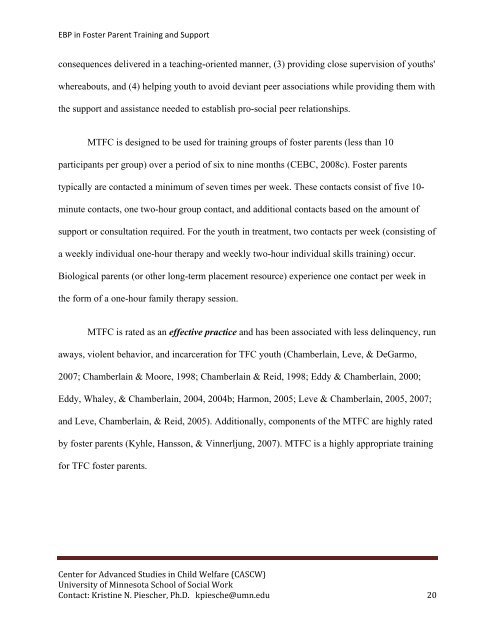Evidence-Based Practice in Foster Parent Training and Support ...
Evidence-Based Practice in Foster Parent Training and Support ...
Evidence-Based Practice in Foster Parent Training and Support ...
Create successful ePaper yourself
Turn your PDF publications into a flip-book with our unique Google optimized e-Paper software.
EBP <strong>in</strong> <strong>Foster</strong> <strong>Parent</strong> Tra<strong>in</strong><strong>in</strong>g <strong>and</strong> <strong>Support</strong>consequences delivered <strong>in</strong> a teach<strong>in</strong>g-oriented manner, (3) provid<strong>in</strong>g close supervision of youths'whereabouts, <strong>and</strong> (4) help<strong>in</strong>g youth to avoid deviant peer associations while provid<strong>in</strong>g them withthe support <strong>and</strong> assistance needed to establish pro-social peer relationships.MTFC is designed to be used for tra<strong>in</strong><strong>in</strong>g groups of foster parents (less than 10participants per group) over a period of six to n<strong>in</strong>e months (CEBC, 2008c). <strong>Foster</strong> parentstypically are contacted a m<strong>in</strong>imum of seven times per week. These contacts consist of five 10-m<strong>in</strong>ute contacts, one two-hour group contact, <strong>and</strong> additional contacts based on the amount ofsupport or consultation required. For the youth <strong>in</strong> treatment, two contacts per week (consist<strong>in</strong>g ofa weekly <strong>in</strong>dividual one-hour therapy <strong>and</strong> weekly two-hour <strong>in</strong>dividual skills tra<strong>in</strong><strong>in</strong>g) occur.Biological parents (or other long-term placement resource) experience one contact per week <strong>in</strong>the form of a one-hour family therapy session.MTFC is rated as an effective practice <strong>and</strong> has been associated with less del<strong>in</strong>quency, runaways, violent behavior, <strong>and</strong> <strong>in</strong>carceration for TFC youth (Chamberla<strong>in</strong>, Leve, & DeGarmo,2007; Chamberla<strong>in</strong> & Moore, 1998; Chamberla<strong>in</strong> & Reid, 1998; Eddy & Chamberla<strong>in</strong>, 2000;Eddy, Whaley, & Chamberla<strong>in</strong>, 2004, 2004b; Harmon, 2005; Leve & Chamberla<strong>in</strong>, 2005, 2007;<strong>and</strong> Leve, Chamberla<strong>in</strong>, & Reid, 2005). Additionally, components of the MTFC are highly ratedby foster parents (Kyhle, Hansson, & V<strong>in</strong>nerljung, 2007). MTFC is a highly appropriate tra<strong>in</strong><strong>in</strong>gfor TFC foster parents.Center for Advanced Studies <strong>in</strong> Child Welfare (CASCW)University of M<strong>in</strong>nesota School of Social WorkContact: Krist<strong>in</strong>e N. Piescher, Ph.D. kpiesche@umn.edu 20
















